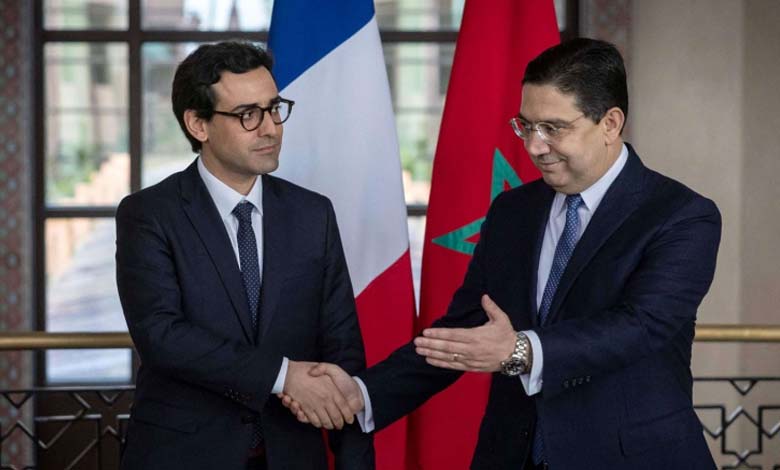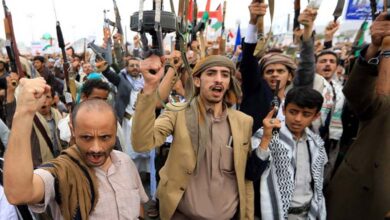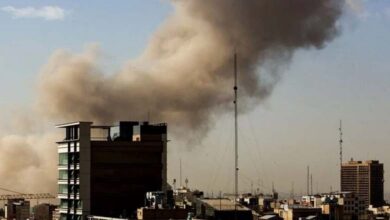Algerian Concern Expressed by Polisario Over French Shift in Positions
Polisario considers France's intention to finance projects in the desert as a provocative step in a stance that essentially reflects Algeria's concerns about the Franco-Moroccan rapprochement

Algeria, through the separatist Polisario Front, has expressed an increasingly undeniable concern over the Franco-Moroccan rapprochement, marking a new phase in relations, especially after Paris’s inclination towards developmental investments in the Moroccan Sahara.
For some time now, Algeria has been wary of Moroccan diplomatic successes in attracting more international partners to invest in the Moroccan Sahara, the shortest path of economic diplomacy to gain further international recognition of Morocco’s sovereignty over its Saharan territories.
Official Algerian media reported today, Sunday, quoting the Polisario-affiliated Ministry of Information, stating in a statement that France’s intention to use the French Development Agency to finance projects in disputed areas of Moroccan Sahara is a “provocative” move.
The ministry stated in a statement that the French agency’s intention to finance projects “constitutes a provocative step and a dangerous escalation of the French hostile stance towards the Sahrawi people and their just cause,” considering it as explicit support for Morocco, which has regained control of about 80% of its Sahara and is working to impose its sovereignty over this entire region through diplomacy and by attracting international partners to invest in its desert regions.
The statement came after the visit of French Minister of Foreign Trade Franck Riester to Morocco last week, where he stated in a post on Twitter during his visit that “renewing Franco-Moroccan relations will include establishing new bridges in the private sector of both countries.”
An article published by the French newspaper Le Monde indicated that the minister mentioned that the French Development Agency could help, through its financing arm for the private sector (Proparco), finance a project including a high-voltage electricity line between the city of Ad Dakhla, the capital of the Moroccan Sahara, and the coastal city of Casablanca.
The statement of the Polisario Ministry of Information, which reflects the official Algerian position before being that of the separatist front that does not have decision-making power and is under the influence of what happens in the dark rooms of Algerian army generals, called on the Sahrawi government once again to all countries of the world, public and private sectors, to refrain from engaging in any activity of any kind on Sahrawi national territory.
This is not the first time that the Polisario has called in vain for Morocco’s international partners to stop and refrain from investing in the Moroccan Sahara, but it has not succeeded in persuading any international actor to turn towards strengthening partnerships with Morocco through investment in the Sahara.
Nor is this the first time that the Polisario has attacked France, with the French diplomat in Rabat, Christophe Lecourtier, having previously been attacked for his statements affirming his country’s support for the autonomy proposal in the Sahara under Moroccan sovereignty and implicitly speaking of the support France has provided to the Moroccan army in its confrontation with the separatist trend.
The separatist Front apparently relied on a French position that aligns with its proposals, especially after the formation of a new government, some of whose members were opposed to the autonomy proposal proposed by Morocco in 2007, but these figures, including Prime Minister Gabriel Attal and Foreign Minister Stéphane Séjourné, and with a personal mandate from President Emmanuel Macron, are working to correct the trajectory of Franco-Moroccan relations by supporting the Moroccan initiative.
Lecourtier’s statements, affirming that his country “stood on Morocco’s side from the beginning of the Sahara conflict,” adding “and even armed it and intervened the French army against the Front more than once,” indicate that France is closer than ever to officially recognizing the Moroccanity of the Sahara, an expected step on a wide scale.
The Front accused Paris of “preventing the establishment of peace and stability in the northwestern African region.” It also accused it of “open complicity with Morocco.” It claimed that this “constituted an obstacle to the unity of the peoples of Greater Morocco and to cooperation and integration between its countries.”
The Polisario seems to indicate in this context that the French position could strain relations with Algeria, which supports and shelters the separatists.
The Front considered that the statements of the French ambassador to Rabat, who assumed his duties in December of last year, are “dangerous,” adding that France “is responsible for the crimes and violations it has committed and continues to commit against it and is the main obstacle to the regular international efforts to end the conflict in the Sahara.”
It also accused it of practicing hegemonic policies, hoping that Paris will overcome this policy, which it described as “obsolete,” and that it will help “establish peace,” considering that Paris’s continued support for Rabat “will have serious consequences for the countries and peoples of the Maghreb region.”
Lecourtier had said in his intervention during a seminar organized by the Faculty of Legal, Economic and Social Sciences – Rabat Agdal last week, that France was determined to revive its relations with Morocco, adding that this was clear through its repeated statements on its intentions towards the Kingdom.
He said, “The flowers that appear at first will later turn into fruits,” recalling the words of the French poet François de Malherbe “and the fruits will fulfill the promise of the flowers,” explaining that his country is well aware of the importance of the Sahara file for Morocco, referring to the statement of King Mohammed VI that the Kingdom views its foreign relations from a Sahara perspective.
To confirm his country’s position on the Moroccan initiative, the French ambassador to Rabat said that his country was the first to present an advanced position and the first country to announce its support for the autonomy initiative at the United Nations. It also opened schools early in the cities of Dakhla and Laâyoune in the southern provinces of the Kingdom and organized its official cultural institutions a one-month tour in those regions.











